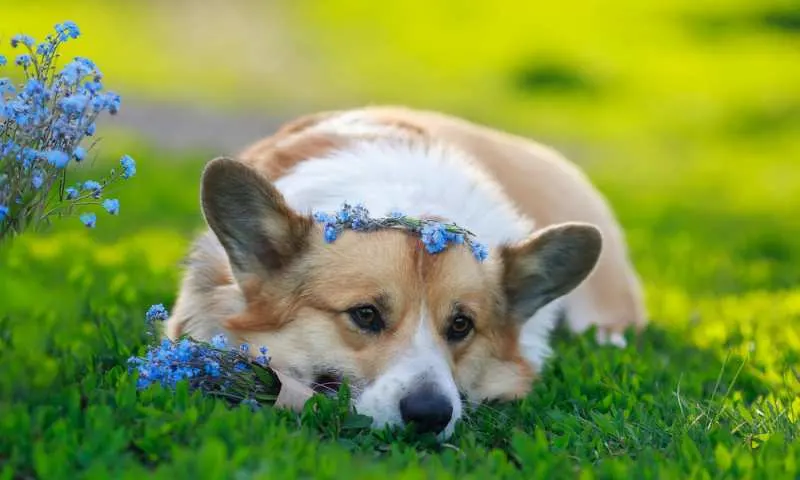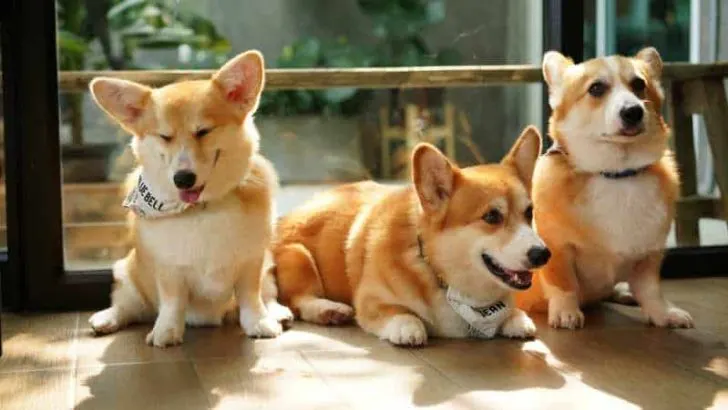Corgis temperament and personality is friendly, playful, outgoing, protective, and in many cases, they can be a bit crazy and controlling. It sounds weird, yes, but they are herding dogs by nature, so they love to be in charge and to control everything around them, even their humans. So this raises a question: are Corgis possessive?
In the course of herding livestock, they would nip at their heels to make them move in the desired direction, so as you can see, controlling is in their genes. If there are new people or dogs around you, they can become super protective and possessive over you or any other family member of yours.
Usually, their possessiveness is not a problem, but you can never be sure when they will cross the line and feel threatened, and god forbid, attack or bite someone. That is why training them early is the best thing you can do.

Are Corgis Possessive Or Aggressive?
Corgis do have an aggressive streak considering they are herding dogs, but in reality, these dogs are usually playful, energetic, loving, trustworthy, and will do everything to please their people. Corgis are not known as a mean and vicious breed, and it is unlikely for them to bite or lash out but as said, you can never know.
They will show signs of aggression when certain events and situations arise. Canine aggression can be a big problem; thankfully, Corgis have developed to become intelligent, hard-working, and obedient. They are keen to show their love and affection, which makes them an excellent choice for a family dog, yet that also means you can expect that they become possessive.
Hostility in Corgis typically occurs in the early stages, when they are puppies, between 6 to 14 weeks old, so this is an ideal time to train your Corgi and socialize them with humans of all ages as well as other dogs and animals to avoid unpleasant situations later.
As an owner, you must take care of their training before they establish themselves as the boss. Herding dogs are prone to developing an alpha complex, so you must show your Corgi, who is in charge, before it’s too late.
The great thing is that their intelligence and eagerness to please their humans means they’re highly responsive to training, so this should not be so hard for you.
Signs Of Aggression In Corgis
So Corgis can become agitated due to various different factors, but how do they display their aggression? Usually, aggression can be spotted very early, which is great since this way, you will be able to take all the measures that you need to prevent a situation from going out of your hands.
If aggression is not handled properly, behavioral problems into adulthood will likely arise, and you will end up having a dog that poses a danger to you, your family members, other dogs, and other people around you.
That is why it is crucial to recognize some early signs of aggression, such as:
Corgis are prone to separation anxiety as well when being left alone for long periods of time. They become anxious, which can only enhance their possessiveness. Also, they can be very destructive and will bark a lot.
Some Corgi even become anxious when family members are scattered all over the house, and then they will do all they can to move people around a central place. This is mainly because they view their family as a flock, and in their heads, they should always stay together.
This kind of behavior should be discouraged at early stages and prevent your pooch from becoming a possessive little monster that likes to bite and nip a heel when he is upset.

How Does Possessive Dog Behavior Looks Like?
Some possessive behavior may not look like a big deal and won’t alarm you much, but these small signs can easily grow into bigger issues later. For example, your dog ignoring you when you ask her or him to drop a tennis ball is a minor form of possessiveness; this will quickly grow into your dog growling or snapping at you when you try to take back a toy.
The first step to managing a possessive dog is to recognize the signs of possessive behavior on time. These are:
- Refusing to give up a toy when asked
- Snapping at other dogs and animals while eating
- Hoarding toys
- Growling at others while holding a toy
- Jealous dog behavior such
Once you know which signs to look out for, you can easily manage their possessiveness.
Prevention
The best way to control your dog’s possessive behavior is to prevent access to the things he guards and which triggers the aggression. So simply don’t keep them in the house. If your dog is possessive over items with high value for him, the easiest solution is not to bring those items into your home.
However, if this is not possible, you can also use doors and baby gates to keep your possessive dog separate from items he may guard. In case your dog is only possessive in certain situations, you can manage when and where you will let him have his valuable treats and toys.
Some dogs guard their food bowl when another dog or animal is around but won’t have a problem eating in a room alone. That means you should always use the environment to manage your Corgis behavior.
Teach your Corgi solid cues like “DROP IT.” Show her or him that obeying will always give something in return. Adding a cue for “TAKE IT” clarifies when something is being offered, which will help avoid behaviors like snatching or taking things that aren’t meant for your pooch. Playing games of trade is highly recommended to teach puppies that giving things up has value!
A possessive dog needs a basic obedience course, from “SIT” to STAY. All these are important for your dog and most useful for dogs who tend to hang on to resources. These three commands are crucial:
- Leave it – This command tells your dog to ignore treats or toys and focus the attention on you or to walk past the thing that triggers him the most. This command will help manage possessiveness.
- Drop it – This command is a key command! It’s especially helpful for dogs that are possessive when it comes to toys. Training them to obey the drop-it command will help prevent possessive behavior even before it starts.
- Trade you – This command is very useful if your dog won’t drop the item when he or she is asked to do so. You offer a better resource than the one your Corgi is guarding, and I guarantee you it will work. For example, if your pooch does not want to let go of the ball, offer him a tasty treat in compensation and see what happens. Make sure that command trade you are always followed with command “Sit”.
Training always takes time and patience, but if you’re consistent enough, you can be sure your Corgi will try even harder to please you.
Possessive dogs are guarding resources or their humans, but the longer you let them get away with possessive guarding, the more it will be reinforced. If you have a hard time saying no to your Corgi when he begs for treats, don’t be disappointed when he growls at another animal over the food.
Teach your dog that all resources come from humans and make him work for everything he wants but first, start small by asking your dog to hold a sit for several minutes before letting him eat his dinner.
This training is a positive and safe way to remind your dog that you are the one who controls the resources and situations. For dogs with severe possessive behavior, in those cases when they snap and growl at humans, a longer training may be necessary.
Desensitization training is a gradual process of changing your dog’s behavior. It’s recommended for dogs who guard their food bowl or growl when you try to take their toy away. Over the course of many weeks, you will teach your Corgi not to react emotionally to a specific object or situation. Desensitization is very effective, but it takes a lot of time, patience, and consistency.

Final Word
Corgis are fantastic dogs, and they make excellent pets for families with little kids. These dogs are loyal and loving, but they can become possessive and aggressive if you, as an owner, do not take it upon yourself to train them to behave well.
Remember that an undisciplined Corgi is an unhappy Corgi, they love to please their humans, and when their humans are in charge, they feel safe and content. However, they are herding dogs, so their dominant side is in their nature, and they will always try to show that off.
Take time each day to teach your puppy not to bite, become anxious when you are not around, or when other people and animals are around you two. Teach him that there is no need for jealousy, and if things do not go in the right direction, do not be discouraged since these things do not resolve overnight.
Keep in mind that if you train your Corgi well, you are likely to have a dog that is friendly to your guests and their pets, very willing, and open to cuddles and play all the time. Good luck!

